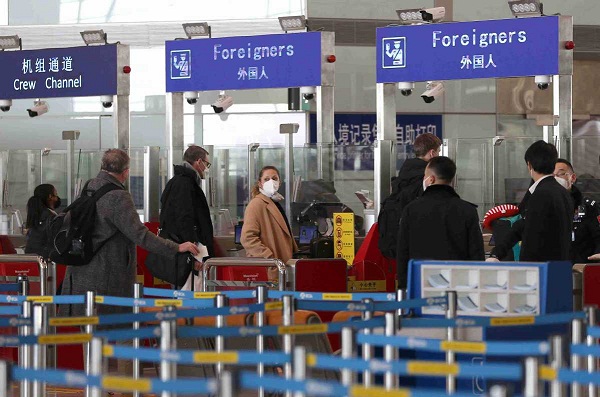
Travelers wait to pass through immigration checkpoints in Beijing Capital International Airport on Jan 8, 2023. [Photo by Zou Hong/China Daily]
China will fully restore fast-lane entry and exit services at all ports starting on Monday, facilitating the cross-border travel of Chinese citizens and foreign nationals.
The National Immigration Administration issued a circular on Thursday announcing the adjustments to immigration policies.
Chinese nationals will be allowed to use fast lanes for expedited border inspection on the following travel documents: Chinese ordinary passports, exit-entry permits for travel to and from Hong Kong, Macao and Taiwan, mainland travel permits for Hong Kong and Macao residents, five-year mainland travel permits for Taiwan residents, and multiple entry permits valid for one year, the administration said in a notice.
Foreigners can use the service with their passports and China-issued ID cards for foreign permanent residents, or with their electronic passports and residence permits with a validity period of more than six months, it added.
Chinese crewmembers working on scheduled international flights and foreign crewmembers who are visa-free or have obtained flight attendant/employment visas or residence permits for one year or longer can also use the channel, said the circular.
China will fully resume group travel permits for mainland residents to Hong Kong and Macao. Mainland residents may submit their applications to any national entry and exit administration center, it said.
In addition, mainland residents can apply for permits to visit relatives, and to work and study in Hong Kong and Macao at any exit and entry administration center across the country.
Immigration authorities will also adjust the validity period of the visa for mainland students studying in Macao from a maximum of one year to the match the length of their study in Macao.
Lin Zhizhuo, a manager of Ctrip, a Chinese travel service provider, said that the adjusted policies will benefit people who are not employed where they have registered residence, and it will greatly ease the visa application process for tourists to Hong Kong and Macao.
As immigration policies have become more flexible, more tailored package products will emerge. The policy of applying for travel permits at any immigration center provides great convenience for tourists, who are not restricted to their place of departure, Lin said.
Ways of traveling to Hong Kong and Macao are also becoming more diversified. In April, high-speed rail services to and from Hong Kong resumed from cities such as Chongqing, Zhengzhou in Henan province, Changsha in Hunan province and Kunming in Yunnan province.
According to Ctrip, orders for group tours to Hong Kong and Macao rose about 70 percent in May from April.
Fang Zhibo, head of the border inspection division of the Hong Kong-Zhuhai-Macao Bridge Exit and Entry Frontier Inspection Station in Guangdong province, said that the station has been using fast-lane services since Jan 8, and the latest policy adjustment will further facilitate the entry and exit of residents from the mainland, Hong Kong, Macao, Taiwan and foreign nationals, and the number of cross-border travelers is expected to increase after the implementation of the policy.
"We will complete the inspection system upgrade and optimize the allocation of police officers, strengthen assistance offered to special groups such as the elderly, and serve the vast number of tourists," Fang said.
According to the National Immigration Administration, immigration authorities nationwide conducted about 6.27 million inspections of people exiting or entering the mainland during the five-day May Day holiday this year, and about 3.15 million of them were for those leaving.
In addition, data released on May 3 by the Ministry of Culture and Tourism showed that during the holiday, outbound tourism rose nearly sevenfold year-on-year.
Fanny Yeung, executive director of the Travel Industry Council of Hong Kong, said that the new measures are good news for the tourism industry. However, it is not expected that there will be a large increase in mainland visitors very soon, and Hong Kong's reception capacity also needs to be improved.

